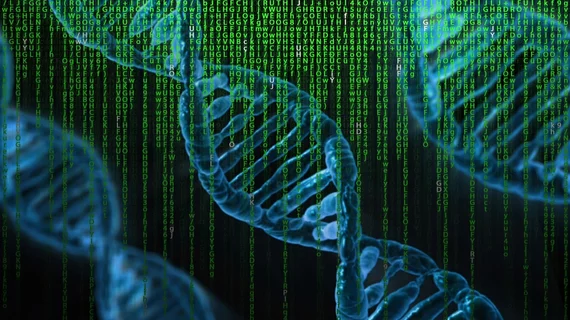Sparks fly as genomic medicine gets better acquainted with AI
Biomedical researchers have been looking to expand the uses of DNA sequencing ever since the human genome project finished its initial mapping mission. That was in 2003.
Twenty years and many refinements later, AI is accelerating genomic medicine’s advance into the promised land of personalized, predictive and preventive care.
Firoz Ahmad, PhD, lays out the contours of the current landscape in an article published by The Economic Times’s Healthworld.com. Ahmad’s day job is running the clinical genomics operation at Unipath Specialty Laboratory, a pathology services concern in India. Here are four highlights of his thinking on AI in genomics and healthcare.
1. AI can speed analysis of data gleaned from genome sequencing. Ahmad points out that such analysis absent an assist from AI is not only slow and complex but also expensive and labor-intensive. How could it be otherwise? One person’s genome can generate 100 terabytes of data. With AI, researchers can accelerate the analytics process by 80 to 100 times, Ahmad explains. More:
‘AI-aided analysis helps clinicians get results quicker, determine what genetic disease a critically ill patient may have and start clinical management accordingly. In today’s world, AI has [already] made significant advances in genomics data interpretation, revolutionizing how we apply genetic data for precision medicine.’
2. AI can personalize care for people suffering with rare genetic diseases. Somewhere between 5,000 and 8,000 distinct rare diseases exist globally. Stricken patients may wait years until receiving a definitive diagnosis and, with it, an optimal treatment plan. Ahmad:
‘AI tools can match a patient’s self-reported symptoms with those of rare diseases and combine the patient’s clinical presentation, family history and high-end genomic sequencing report to predict the disease in a short time. AI-based phenotype-to-genotype mapping methodologies could greatly increase genetic testing diagnostic yield and the identification of individuals with previously unknown genetic diseases.’
3. AI can predict which cancers will metastasize and which will remain localized. This information can be crucial for optimizing treatment planning, Ahmad notes. More:
‘The combination of AI-based models with genomics data can aid in the identification of cancer subtypes, the discovery of new markers and therapeutic targets and a better knowledge of cancer-driving genes—all of which help to provide patients with personalized treatment.’
4. AI can monitor changes in a patient’s genomic data over time. This can help lock in efficacious treatments, guide care steps and save precious time, Ahmad underscores.
‘Days are not far away when a genetic abnormality could be discovered in the first few hours of a newborn’s life, ushering in a new era of next-generation diagnostics. The future of genomics is here, driven by the transformative potential of AI.’

